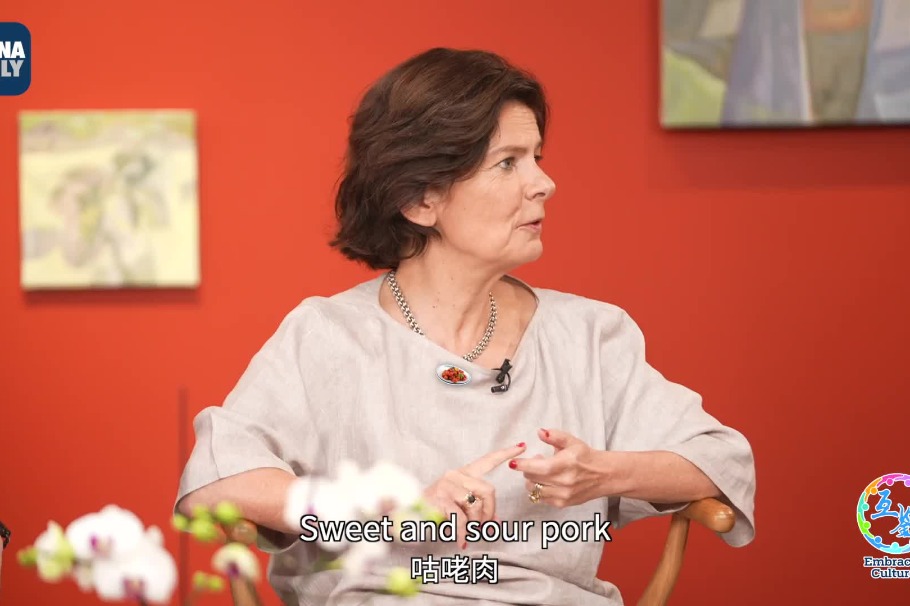李克强总理答中外记者问(双语全文)
CNTV 2014-03-19 15:22

[新加坡《联合早报》记者]去年中国领导人频繁访问周边国家,提出了新的周边外交理念与合作倡议,但本区域仍然存在一些分歧和矛盾。请问您怎么看待中国与周边关系的前景?谢谢。
Lianhe Zaobao of Singapore: Last year, Chinese leaders visited many neighboring countries and put forward new vision on China’s neighborhood diplomacy and cooperation initiatives. But still there exist some disputes and differences in China’s neighborhood. I would like to ask how do you see China’s future relations with its neighbors?
[李克强]你的中文就更标准了,但是还是需要再翻译一次。中国是个发展中国家,实现现代化是13亿人民的共同意志,这需要有和平稳定的周边和国际环境。我记得去年记者会快结束的时候,我说过,中国走和平发展道路的决心是坚定不移的,维护国家主权和领土完整的意志也是不可动摇的。两者归结起来还是要维护稳定,为发展创造良好环境。早在60年前,中国和一些周边国家,就共同倡议和平共处五项原则,四邻周边有时候难免有磕磕碰碰的情况,但是只要我们相互尊重、管控分歧、互利互惠,碰出的应该是和谐的声音,而不是刺耳的噪音。
Li Keqiang: You speak mandarin even better. But still we need the translation. I hope to have your understanding. China is still a developing country. To achieve modernization of the country represents the common aspiration of the 1.3 billion Chinese people. This requires a peaceful and stable neighboring and international environment. I recall that approaching the end of last year’s press conference, I once said that China has an abiding commitment to pursuing peaceful development. We also have an unshakable will in safeguarding China’s sovereignty and territorial integrity. These two points are both for the sake of upholding stability and creating a favorable environment for China’s development. As early as 60 years ago, China and some of its neighbors had jointly initiated the Five Principles of Peaceful Coexistence. When neighbors interact with each other, it’s only natural that sometimes they will run into problems of one kind or another. But as long as they respect each other, properly manage differences and pursue mutual benefit, there will be harmonious sounds instead of jarring noises.
你的问题让我回想起去年访问东盟国家,比如到越南,我和越南领导人达成海上共同开发、陆上合作、金融合作三头并进的原则共识以后,也想听听民间的反应。我就晚上趁工作之余,到了一家小店,那个女店主当时就认出我了,她说欢迎中国客人来,我想这也是给她带来生意啊。我就问她你怎么看邻国的关系?她说还是和平友好吧。和平友好、和平共处,我想这是四邻百姓的愿望,我们需要一起努力,来扩大利益的交汇点,缩小矛盾点,这样就可以和睦相处,也是造福民众。谢谢。
Your question reminds me of my visit to some ASEAN countries last year. During my visit in Vietnam, I reached principled consensus with the Vietnamese leaders about China-Vietnam cooperation in maritime joint development, on the land and in the financial sector. I was curious about how the ordinary people would think about this. So later in the evening, I took some time out of the schedule and visited a small local shop. The shopowner instantly recognized me and she said that she would like to have more Chinese customers. They would bring more businesses to her shop. I asked her how she thought about China’s relationship with its neighbors. She said there should be peace and friendship. Peace, friendship and peaceful co-existence, I believe, represent the common aspirations of all people in China and its neighbors. As long as we all work together to expand common interests and narrow differences, we can live with each other in harmony, bringing greater benefits to our people.
[英国路透社记者]想请教总理,有一个经济问题。中国经济去年增长7.7%。请问总理,您上任一年最大的挑战、最大的困难是什么?再有就是您觉得亟待解决的问题还有哪些?谢谢。
Reuters: China’s economy grew at 7.7% last year. In the past year since you became Chinese premier, what do you think is the biggest challenge and difficulty and what are the pressing issues that need to be resolved?
[李克强]我确实很佩服你们这些驻华记者,能这么流利地说中文。要说去年最大的挑战,那还是经济下行压力加大的挑战。一度中国的中央财政收入出现负增长,金融领域还有所谓“钱荒”,银行间隔夜拆借利率超过了13%,而且用电量、货运量的增幅也大幅回落。国际上也出现了一些舆论,说中国经济可能要硬着陆,还给出了指标,说增长可能只有3%到4%。而对我们来说,财政和货币政策运用空间又很有限,宏观调控确实面临多难选择。怎么办?遇万难还须放胆。当然破困局要用智慧,我们保持定力,创新宏观调控的思路和方式,明确了经济运行的合理区间,就是增长和就业不能越出下限,通胀不能突破上限,而且着力促改革、调结构,让市场发力。正是在以习近平同志为总书记的党中央领导下,经过全国人民的共同奋斗,我们顶住压力,实现了经济社会发展的主要预期目标。
Li Keqiang: I truly admire all these resident journalists of foreign media in China for speaking Chinese so well. The biggest challenge last year was the increased downward pressure on our economy. Central government revenue registered negative growth at one point. There was the so-called “money squeeze” in the financial sector last June. Inter-bank lending rate exceeded 13%. And there was a slump in the growth of electricity consumption and cargo transport volume. There was this view in the international community that the Chinese economy would suffer a hard landing and China’s growth would drop to 3-4%. Moreover, we had only very limited room for manoeuvre in carrying out fiscal and monetary policies, and we were faced with multiple tough choices in exercising macro-control. Under such conditions, what should we do? When confronted with mounting challenges, one needs to show guts. To tackle a difficult situation, one needs to have wisdom. We held our ground. We pursued creative thinking and ways in exercising macro-control and set a proper range for China’s economic operation. That is to say, we worked to ensure that GDP growth and employment would not slide below the lower limit and inflation would not exceed the upper limit. We focused our efforts on boosting reform and making structural adjustment to ensure that the market will play a strong role. Under the leadership of the CPC Central Committee with Comrade Xi Jinping as General Secretary and thanks to the concerted efforts of the entire Chinese people, we faced the pressure down and met our targets.
现在我们看得更多的是困难和问题。今年挑战依然严峻,而且可能会更加复杂。我们既要稳增长、保就业,又要防通胀、控风险,还要提质增效,治理污染,多重目标的实现需要找一个合理的平衡点,这可以说是高难度的动作。但凡事不患难,但患无备。所谓磨好了斧子才能劈开柴。我想只要我们正视困难、直面挑战、趋利避害,就是遇事克难的成功之道。我们有去年应对经济下行的经历,中国经济又有着巨大的潜能和韧性,我们有能力也有条件使今年经济运行保持在合理区间。谢谢。
Now what is on top of our mind is the existing difficulties and problems. We will confront serious challenges this year, and some may be even more complex. We need to keep steady growth, ensure employment, avert inflation and defuse risks. We also need to raise the quality and efficiency of China’s economic development and tackle pollution. So we need to strike a proper balance amidst all these goals and objectives. This is not going to be easy. But the thing we have to fear is not the difficulty itself, but lack of preparedness, just as only a sharpened axe can cut through firewood. We will face up to the difficulties and challenges and make the most of the favorable conditions while averting unfavorable ones. This holds the secret to our success. Moreover, we gained good experience from handling the economic downturn last year, and the Chinese economy has tremendous potential and resilience. So I believe we have the ability and conditions to keep the economic operation within a proper range this year.
[中央电视台、中国网络电视台记者]总理您好。我注意到您在之前回答记者提问的时候说到今年要继续推进简政放权,所以我想就这个话题请您展开来给我们具体谈一谈。因为我们看到这个话题也是您在去年的记者会和今年的报告当中特别强调的一点,关于这一点在采访的时候我听到大家对这项改革有很多的好评,但是说实话我们也听到了不少的抱怨,比如说现在在有的部门依然还存在着办事难的现象,有的部门可能是把次要的权放出去了,但是重要的权还留着。所以我特别想请问总理,关于简政放权的措施您认为怎么样才能真正地落到实处,要减到什么样的程度这项改革任务才算是基本完成了?谢谢。
CCTV: In last year’s press conference and this year’s government work report, you laid special stress on streamlining administration and delegating powers. In our reporting activities we have heard much praise from the society about this reform initiative. Yet at the same time we have also heard complaints among the people that it is still difficult to get things done in some governmental departments. And some governmental departments may have released some less important powers, but still hold on to those more important ones. How to ensure that this reform initiative will be fully implemented? And to what extent can we say this reform task has been completed?
[李克强]去年,中央政府把简政放权作为改革的先手棋,我们确实下了不少的力气,到现在一年的时间,仅中央政府下放取消的审批事项就有416项。更重要的是它释放了一个强烈的信号,给企业松绑、让市场发力。结果企业找政府的少了,地方跑北京的少了,有个统计数字也可以表明这激发了市场的活力。去年新注册企业增加了27.6%,其中私营企业新增30%,这是十多年来最高的。这也表明简政放权是激发市场活力、调动社会创造力的利器,是减少权力寻租、铲除腐败的釜底抽薪之策。十八届三中全会提出,要让市场在资源配置中发挥决定性作用和更好发挥政府作用,我想简政放权是重要的突破口、切入点。
Li Keqiang: Last year, the Chinese government took streamlining administration and delegating power as the top priority on its reform agenda. With tremendous efforts, the central government has abolished or delegated to lower-level governments 416 items subject to State Council review and approval. This has sent out a very strong signal that we will loosen the straitjacket over enterprises and let the market play a strong role. As a result, fewer enterprises find it necessary to turn to the government and fewer local governments find it necessary to turn to the central government. This reform initiative has tremendously boosted market dynamism as shown in the following statistics: The number of newly registered businesses last year increased by 27.6%, among which the number of newly registered private businesses increased by 30%, the highest in over ten years. This shows that streamlining administration and delegating power is a powerful tool in energizing the market and stimulating social creativity. It is also the fundamental solution for cutting rent-seeking behavior and uprooting corruption. It was decided at the Third Plenum of the 18th CPC Central Committee that the market will play a decisive role in allocating resources and the government should better play its role. Streamlining administration and delegating powers is an important starting point in this direction.
当然,放并不是说政府就不管了,我们讲的是放管结合。要让政府有更多的精力来完善和创新宏观调控,尤其是加强事中事后的监管。对一些搞坑蒙拐骗、假冒伪劣、侵犯知识产权、蓄意污染环境,违背市场公平竞争原则的行为,那就要严加监管、严厉惩处。放管结合都要体现公平原则。当然,我们在推进简政放权当中,也确实遇到了像避重就轻、中间梗阻、最后一公里不通畅等问题。开了弓哪还有回头箭?我们只能是一抓到底、一往无前。我们还要继续去啃“硬骨头”,至于说到什么程度满意,那就是正确地处理好政府和市场的关系,市场经济也是法治经济,我们要努力做到让市场主体“法无禁止即可为”,让政府部门“法无授权不可为”,调动千千万万人的积极性,为中国经济的发展不断地注入新动力。谢谢。
Delegation of power does not mean that the government will stay out of everything. What we need is both power delegation and tightened oversight. This way, the government can have extra energy to focus on pursuing creative and better macro-control. In particular, supervision over these delegated matters should be tightened when these matters are being handled and after they have been handled. Such behaviors as cheating and swindling of marketplace, making and selling of fake or substandard goods, violation of intellectual property rights, polluting activities and those activities that obstruct fair market competition will be put under rigorous oversight and severely punished. The principle of equity should be reflected in both power delegation and tightened oversight. I am aware that in the course of power delegation there have been such problems as a perfunctory attitude, midway obstruction or power delegation getting stuck in the last mile. But how can an arrow shot be turned back? We are determined to see this reform through. We are prepared to take on tough challenges in pursuing this reform initiative. As to what extent will we feel satisfied, we will keep up this reform until there is a proper relationship between the government and the market. The market economy is one based on the rule of law. We need to ensure that market entities can do anything which is not prohibited by the law, and government departments cannot do anything unless it is mandated by the law, so as to mobilize the initiative of all sides and add new impetus to the growth of the Chinese economy.

















 英语点津微信
英语点津微信 双语小程序
双语小程序